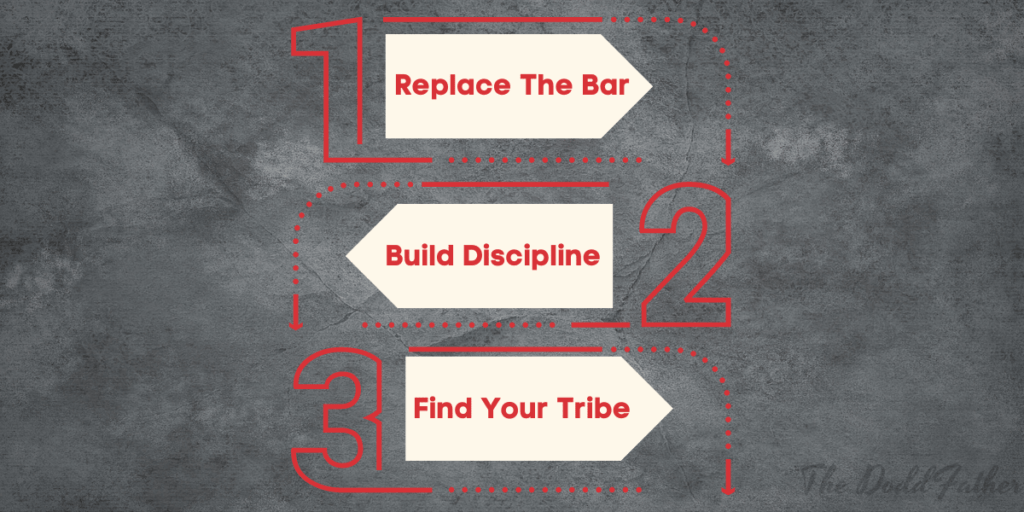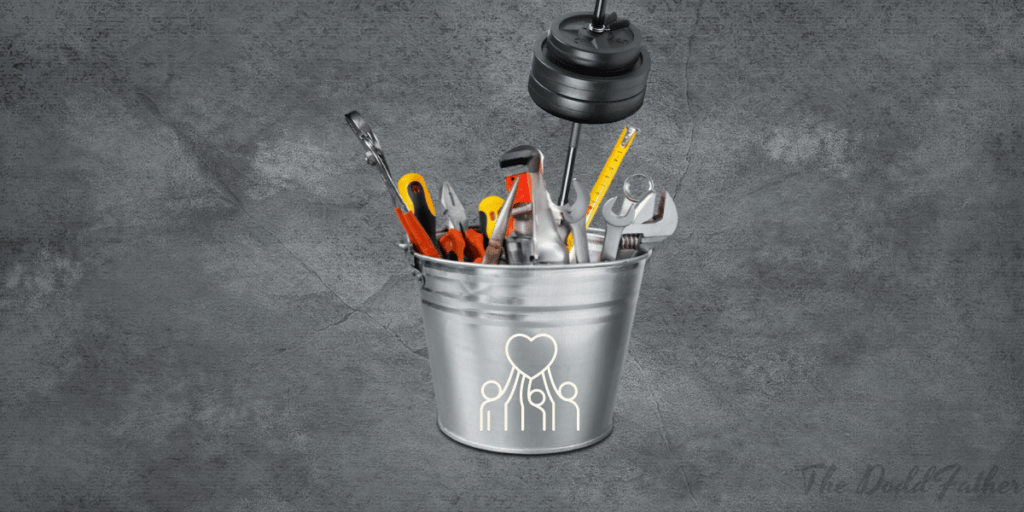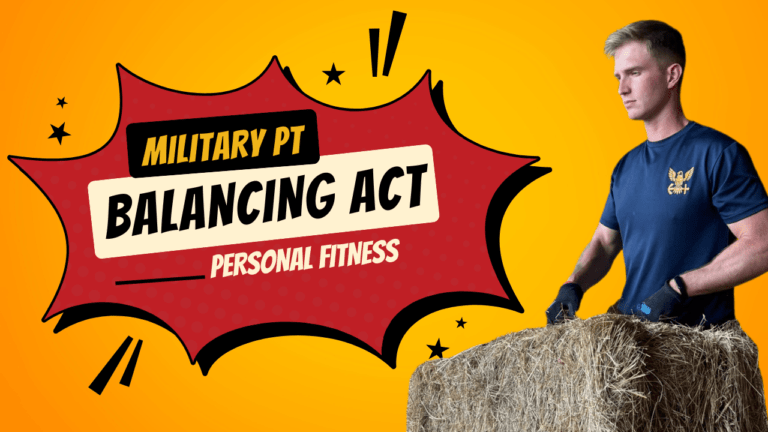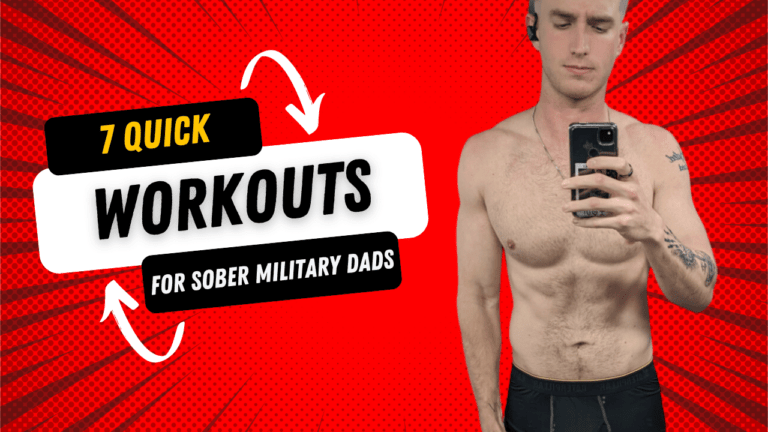
Cody Dodd is a NASM-certified personal trainer and Navy Command Fitness Leader who uses his fitness expertise to write fitness content for The DoddFather. Cody has transformed his physique and confidence by understanding the principles of exercise and fitness.
It all started with a radical fat loss of 55 pounds. From 225 to 170. From a kid who once couldn’t do a pull up, to knocking out 20 pullups in a Navy command competition while floating in the middle of the ocean.
He has a diverse writing and editing background that’s primarily focused on health and fitness, Navy life, and dad life. His work has been featured in Good Dads, as well as Platform Launchers, and Daddying.
Are you a military dad navigating sobriety, seeking a way to channel your strength and discipline into a positive outlet?
Strength training could be your secret weapon! It’s not just about building muscle – it’s about fortifying your mental resilience, managing stress, and boosting your overall well-being.
Imagine feeling more confident, energized, and in control. Strength training as a sober military dad can help you:
- Conquer cravings: Physical exertion helps release endorphins, those feel-good chemicals that battle urges.
- Build discipline: The structure and routine of training reinforce the discipline you already have.
- Channel energy: Instead of dwelling on old habits, you’ll be focused on pushing your physical limits.
- Find a community: Connect with other sober military dads who share your commitment to strength.
The impact of strength training on recovery is far-reaching. According to a study published by PLOS, incorporating simple workouts like weight training into treatment improved the likelihood of recovery from alcoholism or substance abuse. Plus, the brain chemicals released during a workout can help to undo some of the damage that may have occurred during your drinking days.
If you’re ready to fuel your sobriety journey and become the strongest version of yourself, keep reading. We’ll break down the basics of strength training and how it can supercharge your sobriety success in the military. Join the ranks of strength training sober military dads!
Editorial Note: We earn a commission from partner links on The DoddFather. Commissions do not affect our editors’ opinions or evaluations. Learn more about our Editorial Process.
Key Takeaways
- Strength training is a powerful tool for sobriety: It helps manage cravings, build discipline, channel energy, and foster a supportive community.
- The benefits extend beyond physical: Strength training improves mental resilience, boosts self-esteem, and enhances overall well-being.
- It’s a holistic approach to recovery: Combining strength training with mindfulness, hobbies, and professional support creates a well-rounded path to sobriety and lasting health.
Strength Training Sober Military Dads: Can You Build Muscle Without Booze?
Can you pack on muscle without cracking a beer? You bet your camo pants you can! Here’s the big thing: booze can actually hurt your gains. It messes with your sleep, recovery, and hormones – the exact opposite of what you need to build muscle.
But don’t sweat it, you don’t need a fancy gym or protein shakes to get stronger. Your own body weight is a powerful tool. Think push-ups, pull-ups, squats, lunges – all awesome exercises that can build serious muscle.
Plus, there’s a whole community of sober military dads who are crushing their fitness goals without a drop of alcohol. We call them “The Ranks of Strength Training Sober Military Dads”. So toss those excuses aside and let’s get to work!
Sober & Strong: How Strength Training Empowers Military Dads in Every Aspect of Life

Strength training isn’t just about pumping iron; it’s a catalyst, especially for military dads navigating sobriety. Whether you started lifting at a young age or are trying it for the first time, the benefits reach far beyond the gym. If you’re struggling with extra weight, strength training can help fight obesity and give you back your confidence.
But the real magic is how it spills over into everything else. You’ll have more energy for your family, a clearer head for decision-making, and a stronger sense of discipline that carries over to your career. It’s not just about looking good, it’s about living better.
Your Roadmap to Sobriety and Strength: A 3-Step Guide for Military Dads
Navigating sobriety while juggling the demands of military life can feel like a battle. But guess what? You’ve already got the discipline and resilience needed to win this fight. This three-step guide is designed specifically for military dads like you, offering a clear path to reclaim your strength – both in the gym and in life. Whether you’re a recovering alcoholic or struggling with addiction, these steps will empower you to transform your life.
- Replace the Bar: Trade the bar in the pub for the barbell in the gym. Structure a strength training regimen that fits your schedule and goals. This isn’t just about muscle; it’s about replacing old habits with healthy ones.
- Build Discipline and Resilience: Strength training is a mental game as much as it is physical. You’ll learn to push your limits, overcome obstacles, and develop the kind of resilience that translates to every aspect of your sobriety journey.
- Find Your Tribe: Connect with other sober military dads. They get it. They’ll cheer you on, hold you accountable, and share their own experiences. This is your support system, your squad, your band of brothers in sobriety.
Ready to dive deeper into each step? Let’s break down exactly how to replace the bar, build resilience, and create a community that will empower you to thrive.

1.) Replace the Bar with the Barbell
Ditching the bar scene for the gym is like trading your beer for a barbell, and replacing that artificial dopamine rush with the real deal. You’re going from a place where everyone’s drinking to a place where you’re getting stronger, both physically and mentally.
It’s a switch that not only shapes your body but also toughens up your mind and spirit. The barbell becomes your buddy, helping you beat stress and put your energy to good use. It’s a huge step towards a healthier life, and it’s all about using weight training to focus on your well-being.
2.) Build Discipline and Resilience
Getting strong isn’t just about muscles; it’s about building a rock-solid mindset. When you push yourself in the gym, you’re not just lifting weights, you’re building the willpower necessary to resist temptation and stay on track. Every tough workout you conquer teaches you how to bounce back from setbacks, which is a huge deal when you’re fighting addiction.
Sticking to a workout schedule gives you that sense of control you need to stay on top of your sobriety. Plus, dealing with those “I can’t do this anymore” moments during exercise actually helps you handle other tough situations in life, like the urge to drink.
So, every time you hit the gym, you’re not just building a stronger body, you’re also building a stronger mind. And the best part? You wake up the next day feeling proud and accomplished, ready to tackle anything that comes your way.
3.) Find Your Tribe
Having a solid crew to back you up is huge. When you’re surrounded by people who truly get what you’re going through, it lifts your spirits and makes the journey so much easier. The right support group will cheer you on, keep you accountable, and make both staying sober and getting strong a whole lot more fun.
Connecting with other military dads who are after the same goals creates a sense of belonging that makes everything feel less daunting. You’ll celebrate your victories together, tackle challenges as a team, and inspire each other every step of the way. Being around a lot of people who are striving for similar goals creates an environment where growth is inevitable, especially with all of us vets looking out for each other.
Remember, you’re not in this alone. Finding your tribe means fueling each other’s fire and achieving greatness together.
Completely unique poems catered to the different dad types. Each poem neatly formatted on a beautiful card that you can print at home!

Navigating the Path: Crucial Considerations for Embracing Strength Training

Injury prevention, sleep, and nutrition play a huge role in getting the most out of your strength training journey. If you get hurt, don’t try to push through it. Instead, focus on rehab to get back on track safely. Remember, consistency is key to making progress.
Getting enough sleep is super important for your muscles to recover and grow stronger. When you don’t sleep well, it can really mess with your hormones and energy levels, making it harder to get results. Aim for 7-8 hours of good sleep as much as possible. I know how difficult it can be to come by quality and quantity sleep in the military. Take it when you can get it.
Then there’s food. Don’t worry, you don’t have to eat perfectly all the time. Just try to eat mostly nutritious foods that fuel your body. Tailor your plan to your goals and keep it simple.
Want to gain weight? Eat more. Want to lose weight? Eat less. Don’t cut anything out completely, but avoid going overboard on junk food, as excess calories can make it harder to reach your goals.
Beyond the Barbell: Expanding Your Sobriety Toolkit as a Fit Dad

Besides pumping iron in the weight room, there are other things you can do to feel your best as a sober dad. Ever heard of mindfulness and meditation? It’s like weightlifting for your mind and emotions! It won’t take all your hard-earned dollars, and it can really help you manage stress and build resilience. There are tons of free resources online or apps you can use to get started.
Another thing that can be super helpful is involving yourself in hobbies or activities you enjoy. Maybe it’s fishing, woodworking, or even joining a local sports league. Whatever it is, having something to look forward to outside of work and family can do wonders for your overall happiness and well-being. It’s also a great way to connect with other people who share your interests.
Lastly, don’t be afraid to reach out for help if you’re struggling. As a military veteran, you may be eligible for mental health services through the VA or other armed forces programs. There are also plenty of therapists and counselors in the community who specialize in addiction and mental health. Asking for help is a testament of strength, not weakness.
How Neglecting Strength Training Impacts Overall Wellness in Sobriety
Staying sober is a huge accomplishment, but it’s just one piece of the puzzle to health and wellness. Many recovering addicts, like veterans, often find themselves stuck in a cycle of inactivity. They might be glued to the TV, numbed out, or dealing with so much pain they can barely move. This lack of physical activity can hurt your well-being in sobriety.
Exercise, especially strength training, is a powerful tool for boosting your mood, reducing stress, and improving sleep. When you skip strength training, you’re missing out on these benefits and making it harder to stay on track with your sobriety. Regular exercise can ramp up your self-esteem and body image, which can be especially important for those in recovery who might be struggling with negative thoughts about themselves.
Neglecting strength training can lead to other physical health problems that can make sobriety more challenging. Weak muscles and bones can lead to chronic pain and injuries, which can tempt you to turn back to old habits for relief. Conversely, strength training can help improve your overall physical health and resilience, making it easier to resist cravings and maintain your sobriety.
Conclusion: My Journey to Sobriety Through Strength Training
I’ve seen firsthand how combining sobriety with strength training can be powerful. It strengthens your body and mind, helping you beat your demons and build resilience. I used to drink to numb the pain from my experiences, but lifting weights gave me a healthy outlet to face those feelings head-on. Strength training is a foundational part of my life now.
This isn’t just about muscles; it’s about personal growth. It teaches you discipline, perseverance, and how to face challenges head-on. It allows you to pay close attention to your inner dialogue and not succumb to the negative thoughts that keep you trapped.
If you’re a military dad thinking about lifting weights, go for it! Don’t be afraid to join the strength training sober military dads. It’s more than just fitness; it’s a journey to transform your life and become the best version of yourself.
The road might be tough, but with the right mindset, support, and willpower, you can overcome any obstacles. Remember, you’re not just lifting weights; you’re lifting your life!
Completely unique poems catered to the different dad types. Each poem neatly formatted on a beautiful card that you can print at home!

Frequently Asked Questions
What is the best time of day for strength training?
When it comes to strength training, the perfect time really boils down to what works best for you and fits into your schedule. For some, starting their day with a workout is the way to go, giving them an energy boost. On the other hand, there are those who like hitting the gym in the evening as it helps them relax after a long day. The most important thing is finding a slot that lets you focus on your strength training without messing up your daily plans.
How can I balance strength training with military duties and family time?
Finding the right balance between strength training, military duties, and spending time with family means you’ve got to be smart about managing your time and setting priorities. Here are a few ways to make it work:
- Plan your workouts ahead of time and see them as appointments.
- Talk to your family about what you’re doing for fitness and get them involved in some way.
- Be ready to change up when you exercise if something comes up.
By following these steps, not only will you progress in your fitness journey but also ensure that neither duty nor family is neglected.
How do I start strength training if I’ve never done it before?
When you’re just getting into strength training, it’s really important to make sure you’re doing the exercises right. Begin with weights that aren’t too heavy for you and slowly work your way up, making things a bit more challenging as you go. Don’t forget to take enough breaks to let your body recover. For a workout plan that fits just right, think about asking a personal trainer for help.
Can strength training help with mental health issues like PTSD?
When you take part in strength training, it’s not just about getting physically stronger. It can also be a big help with mental health problems like PTSD. By hitting those reps, you give yourself a way to deal with stress that feels good, and at the same time, it can make you feel better about yourself and improve how happy and healthy you feel overall. The benefits of exercise go beyond the body; they really help your mind too.




